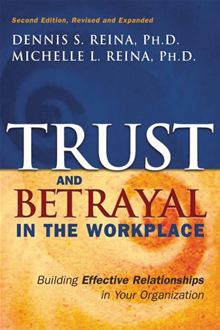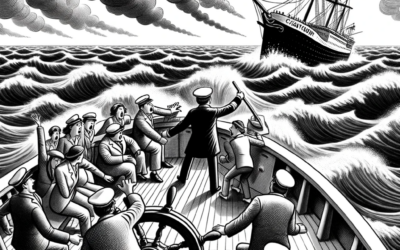This is Part II of an interview with both Michelle and Dennis Reina based on the research done for their book Trust & Betrayal in the Workplace.
Trust is often brought up as one of the core competencies that leaders must demonstrate. What is unique about your approach that helps leaders become trustworthy?
We define the three types of Transactional Trust® and the 16 behaviors that are essential for a leader’s trustworthiness.
The three types of Transactional Trust are:
- The Trust of Character – Contractual Trust
- The Trust of Disclosure – Communication Trust
- The Trust of Capability – Competence Trust
Each of these types has corresponding behaviors.
Thousands of people completed an online values assessment that I created, and Honesty, Love and Trust are consistently the highest ranking values. With people putting Honesty and Trust at the top of their values, why are we having such issues around trust in the workplace?
As mentioned earlier in our interview, there are many challenges to building trust in the workplace: Trust is highly complex, emotionally provocative–both in the positive and negative sense and it means different things to different people. Trust is fragile–yet it is taken for granted until it is broken; then people often do not know how to deal with the consequences; they do not know how to effectively rebuild trust.
At the interpersonal level, because trust means different things to different people- there are many disconnects and misunderstandings that take place. People do not fully know or understand the complexity of trust dynamics in interpersonal relations. They are often unaware of the minor, unintentional ways in which they inadvertently break trust. And instead of people dealing directly with these transgressions–they go unaddressed (not unnoticed) and accumulate and become major over time.
At the organizational level, trust is often broken through change. Yet, it is not the change itself that necessarily breaks trust, but how it is managed. Especially during times of transition, people have certain needs: needs for information–What is the direction the organization is heading? They have needs for belonging–What are my new roles and responsibilities? Where will I be working? Will I be working? Will I have a job? They have needs for competence–Will I be able to keep up with that which is expected of me?
There has been much debate recently about whether MBA programs ought help teach values such as trust. Some argue that it may be too late for students to learn values such as trust as an MBA student–that they need to figure this out much earlier, in their homes. Others argue that students ought to sign an ethics oath when they start their MBA program. How do you come out in this discussion? Where do you think developing trust can have the greatest impact in an organization or society?
| The Daily Show With Jon Stewart | Mon – Thurs 11p / 10c | |||
| MBA Ethics Oath | ||||
|
||||
What we know from human development research is that learning to trust (our capacity for trust) starts at day 1 with our caregivers at birth. The first two years of a child’s life are critical to development of strong foundations of trust behavior. Our values are formulating up to around age 11 or so.
That said, in our executive coaching work with leaders, particularly those individuals who have come from rough beginnings-for example: an individual orphaned at an early age, bounced around different abusive foster homes growing up, etc. It is possible for this individual with a low capacity to trust to become a highly trustworthy leader. Yet, it takes a lot of inner work; starting with being aware of one’s own fears, challenges and continually working to overcome them.
Signing an ethics oath may bring to the students attention that trustworthiness is important but it does not insure the
individual will be trustworthy in the moment of truth.
Building trust is everyone’s responsibility. In an organization, it starts at the top leadership; but again, trust building behaviors need to be practiced by everyone at all levels to transform the culture or society.
Most books talk about the need for leaders to surround themselves with trustworthy team members. It has always seemed to me that the leader must be the one who trusts their teams first rather than the other way around. Where do you think trust begins?
Again, trust is everyone’s responsibility–while leadership needs to initiate trustworthy behavior–everyone needs to practice it. (see above and below)
Oftentimes people believe trust is earned over time. Is this really true? Is there a way to accelerate trust among coworkers? (Read tomorrows post!)
Related Posts:
- Building Trust in Your Organization
- 90% of Employees Feel Betrayal Frequently
- Trust Begins With You! What is Your Trust Score?
- 5 Questions to Ask to Build Trust
Leadership Style Assessment – What leadership style are you?



